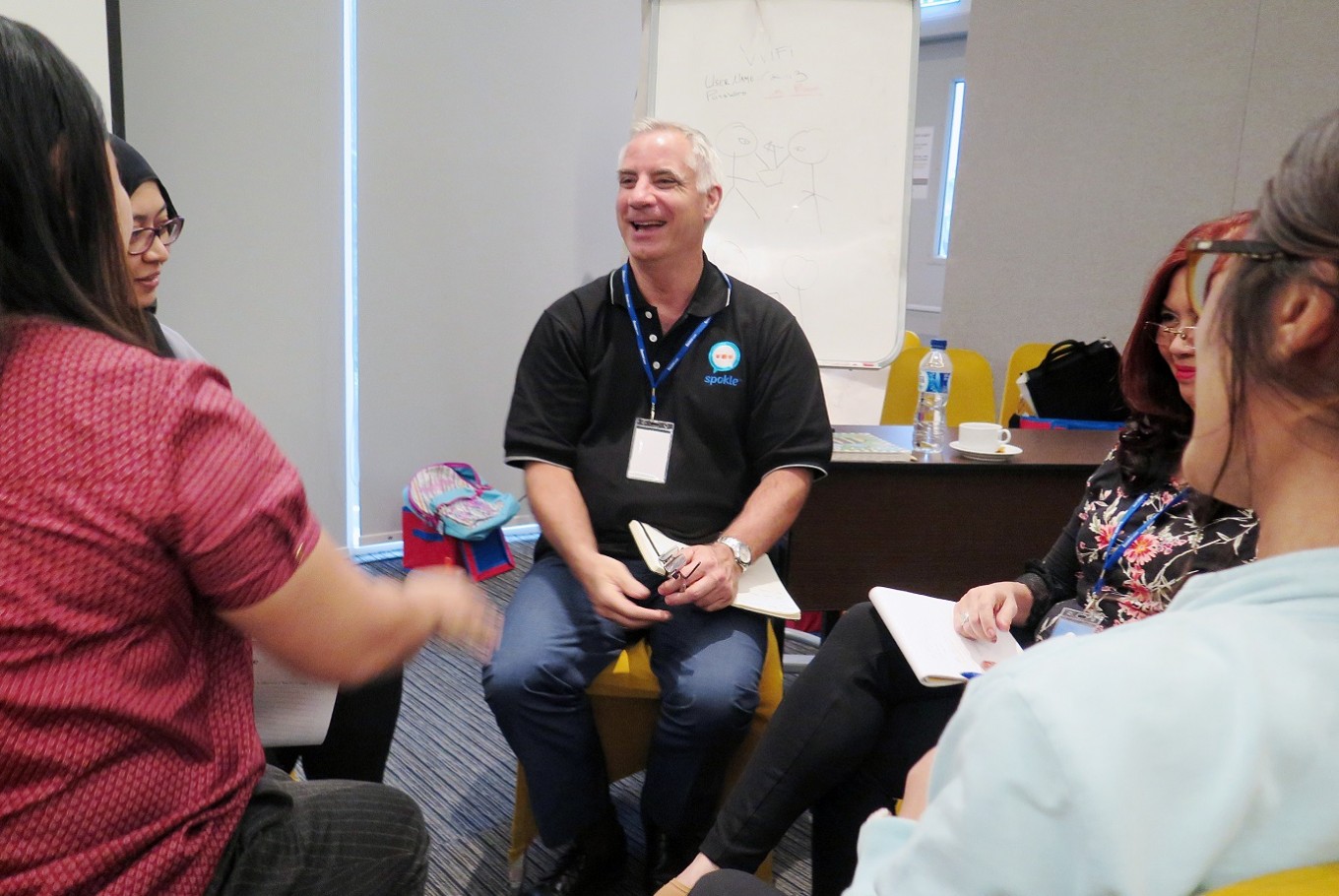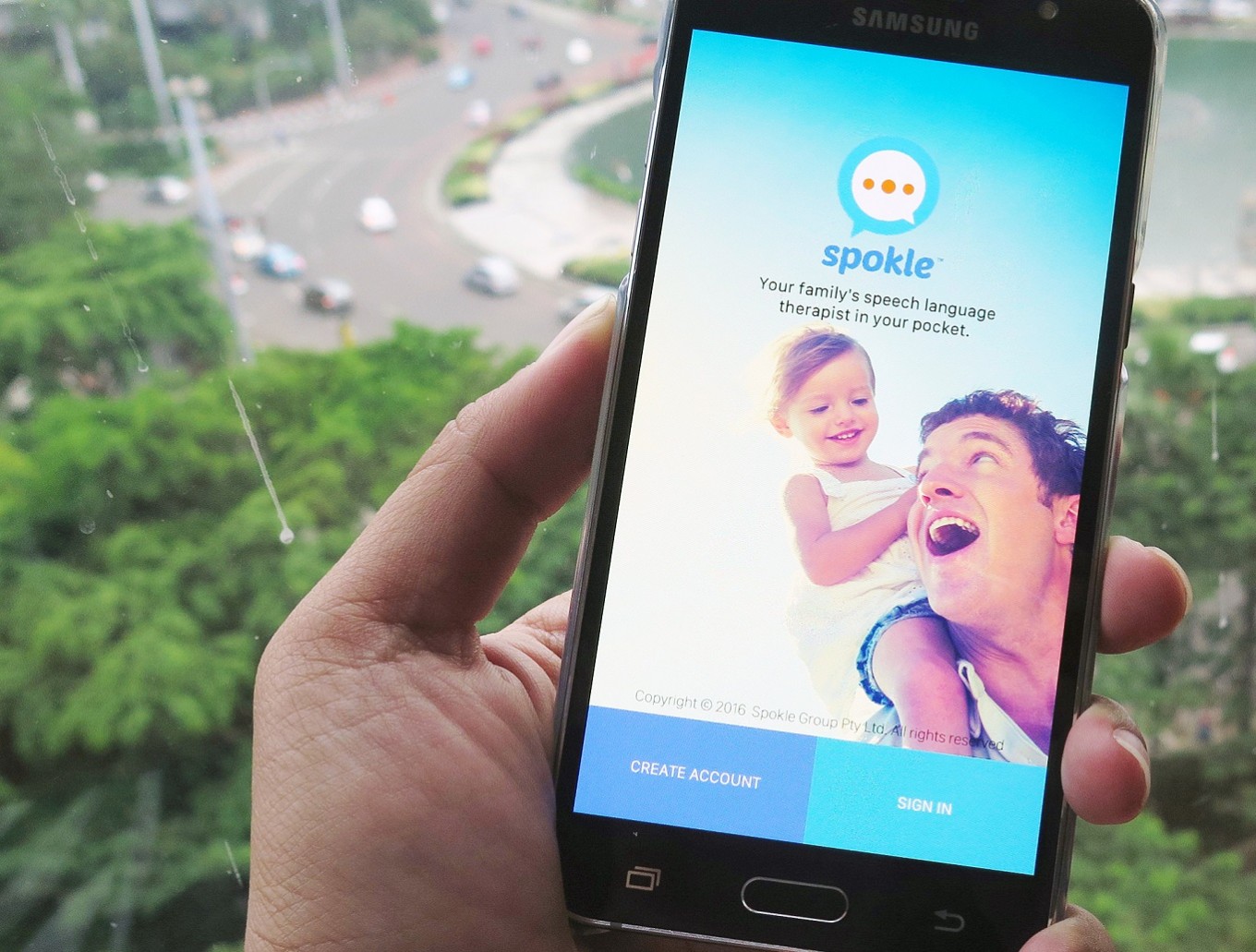Popular Reads
Top Results
Can't find what you're looking for?
View all search resultsPopular Reads
Top Results
Can't find what you're looking for?
View all search resultsSpokle app offers family centered therapy
Spokle app aims to help children struggling to develop communication skills that lead to spoken language, to pay attention and to interact appropriately with others.
Change text size
Gift Premium Articles
to Anyone
R
uami Famade waited five-anda-half years to hear her daughter, Calista Davina, 6, call her “mommy.” She is unable to hold back her tears every time she recalls the moment.
Doctors diagnosed her daughter with autism spectrum and hyperactivity disorders. Like other parents having children with special needs, the 36-year-old took her daughter to take part in face-toface therapy to improve her communication skills.
“I began to worry about her communication skills when she was aged oneand-a-half,” Ruami said, admitting that taking care of a child with special needs was neither easy nor cheap.
However, Ruami has never given up. Since September 2016, she has been a “therapist” for her daughter at home through the Spokle mobile application that delivers speech and language therapy resources for families with children with special needs.
Read also: A Muppet with autism to be welcomed soon on 'Sesame Street'
“Parents who have children with special needs usually go to therapists and the cost of treatment is not cheap, but there is no guarantee that it will work,” she said. “Spokle contains easy-to-follow video tutorials that can be easily applied by parents at home.”
Since September, nearly 50 parents with children with special needs, including Ruami, have used the Spokle app. On Saturday, she shared her experience during its launch in Jakarta.
 Ask me: Parents of children with special needs consult therapist Andrew Kendrick (center) during the launch of the Spokle app in Jakarta.(JP/A. Kurniawan Ulung)
Ask me: Parents of children with special needs consult therapist Andrew Kendrick (center) during the launch of the Spokle app in Jakarta.(JP/A. Kurniawan Ulung)
Produced by Australia-based health services company Spokle Group, the Spokle app aims to help children struggling to develop communication skills that lead to spoken language, to pay attention and to interact appropriately with others.
The app, which can be downloaded through Google Play Store, also helps children who have problems with sensory development, such as regular tantrums and difficulties eating.
The Spokle app, which uses English and Indonesian, connects families to expert knowledge in a way that is affordable, convenient and cuts across geographical barriers.
The app is designed to be a “YouTube channel” for parents with children with special needs because it is home to more than 300 fun videos with real-life examples they can learn and try out in any situation to make therapy enjoyable, according to its founder, Elisabeth Yunarko.
Elisabeth is not a therapist by training. For the app, she teamed up with five experts, ranging from speech language therapists to auditory verbal therapists, from Australia and New Zealand to formulate programs, which are applicable for children as young as 12 months of age.
The app also includes modules that cover various topics, such as “Developing Your Child’s Communication Skills,” “Sensory Integration Activities” and “Strategies and Tips on Managing Behavior.”
Although the programs were created by foreigners, the videos featured in the app are mostly contributed by Indonesian families who have tried the app.
Read also: Integrated education may not be ideal for all special needs kids
“At least 90 percent of the videos are from Indonesia,” Elisabeth said of the app, which is also available in Australia, New Zealand, Malaysia, Singapore and the Philippines.
The idea to make the app came to her mind after she met parents with children with special needs in a parenting seminar in 2015. A parent with a child with hearing disorders had to leave their home in Palangkaraya, Central Kalimantan, to take part in face-to-face therapy in Surabaya, East Java, a story that touched her heart.
“Once every two weeks, the mother and her child went to Surabaya. In terms of time and financial resources it was a burden. She cried,” she said. “I heard that now, they’ve decided to live in East Java.”
When she was in Australia, she witnessed that people were already familiar with telepractice, the application of telecommunications technology that allows therapists and speech pathologists to deliver services at a distance by linking them to patients for assessment and consultation via video.
In April 2016, Elisabeth founded the Spokle Group to telepractice in Indonesia.
“I was so frustrated at seeing how hard it was for families to get trusted help. Lack of specialists, geography, cost, time pressures, stigma, knowledge and lack of community connections really make families’ everyday lives so hard,” she said.
However, the Spokle app, which took one year to make, is not aimed at replacing face-to-face therapy because they complement each other, Elisabeth says.
“If we can guide parents in the right direction, they can also be therapist or teacher for their children,” she said, describing the way as “a family-centered approach.”
Parents can also track the progress of their children through simple quizzes featured in the app.
Psychologist Rosdiana Setyaningrum said that if communication problems faced by children were not solved as early as possible, the number of psychological problems they had would increase during their transition to adulthood.
Elisabeth hopes that in the future, she can team up with Indonesian therapists to develop the Spokle app further.











